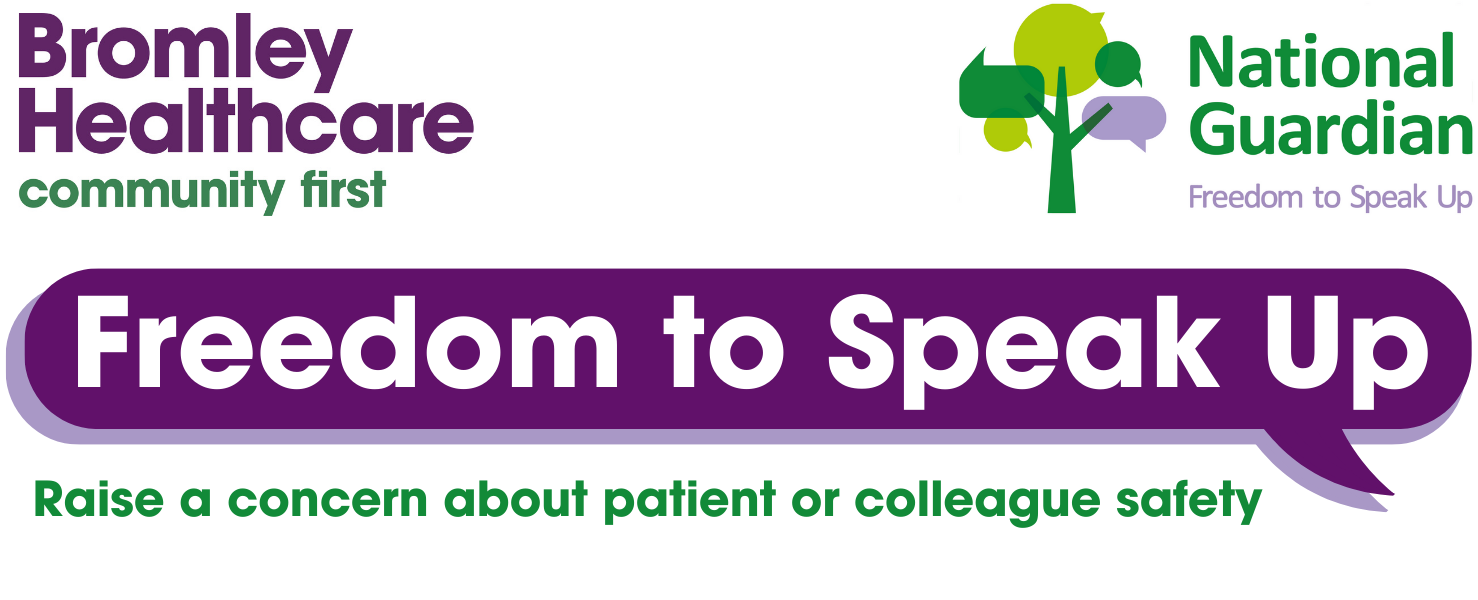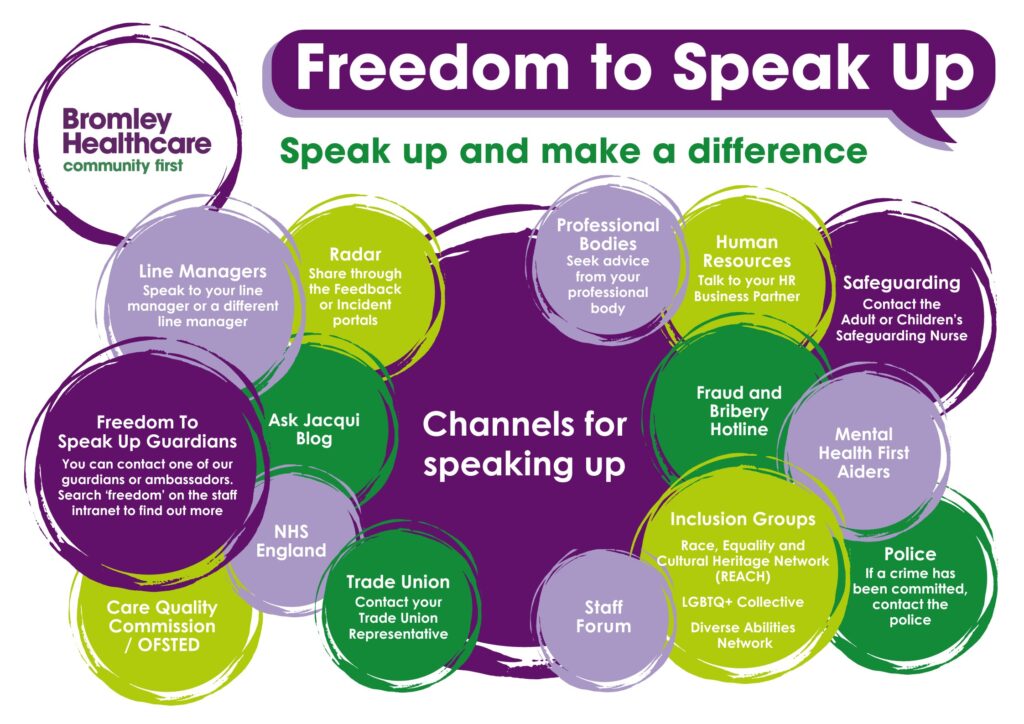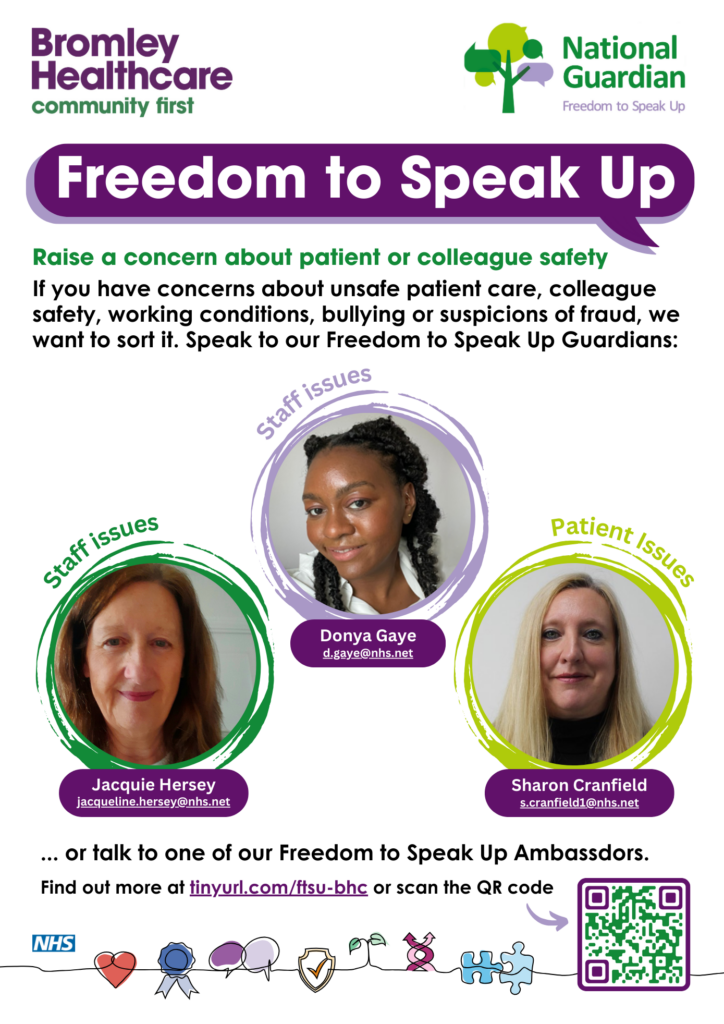Freedom to Speak Up

We want to support a culture of learning, openness and transparency throughout Bromley Healthcare.
We want everyone to feel safe to speak up and we want to hear about your concerns. When things go wrong, we need to make sure that lessons are learned, and things are improved. If you think something might go wrong, it is important that you feel able to speak up so that potential harm is prevented.
Even when things are good, but could be even better, you should feel able to say something and expect that your suggestion is listened to and used as an opportunity for improvement. Please see the guidance below for information on our Freedom to Speak Up Guardians and Ambassadors and refer to the Freedom to Speak Up policy.
What is speaking up?
Speaking up is about voicing your concerns on anything that gets in the way of doing a great job.
Speaking up about any concern you have at work is vitally important. It will help us to keep improving patient care and staff experience. When we use the terms ‘speaking up’, ‘raising a matter of concern’ or ‘whistleblowing’ we are referring to the same kinds of things.
If you see something at work that you believe is negligent, improper or illegal then you should report this to the relevant people.
Our Freedom to Speak Up Guardians support colleagues to speak up when they feel that they are unable to in other ways. The Freedom to Speak up Guardian has a specific remit of ensuring processes are in place to empower and encourage staff to speak up safely. They ensure concerns are investigated appropriately and provide regular reports to the Executive team on areas of concern raised.
Who can speak up?
Freedom to Speak Up is for anyone who works at Bromley Healthcare. We want to hear about any concerns you have, whichever part of the organisation you work in.
We know some groups in our workforce feel they are seldom heard or are reluctant to speak up. You could be an agency worker, bank worker, locum or student. We also know that workers with disabilities, or from a minority ethnic background or the LGBTQ+ community do not always feel able to speak up.
Speaking up is for all our people and we want to hear all our people's concerns.
What should I speak up about?
Sometimes it is only through speaking out that concerns come to light and can be addressed before real harm is done.
The harm might be to patient safety, or the health and safety of patients, members of the public or members of staff or to the finances or reputation of Bromley Healthcare for example.
If you have a genuine concern about malpractice, wrongdoing or fraud in the at Bromley Healthcare, then you have a duty to speak up.
Speaking up can inform the people who need to know about these concerns. You might need to speak up if you are aware of any of the following:
Unsafe patient care or unacceptable quality of care
Unsafe working conditions for you or others
Inadequate induction or training for staff
Lack of, or poor, response to a reported patient safety incident
Lack of, or poor, response to a reported staff experience issue
Suspicions of fraud (which can also be reported to our counter-fraud team)
Poor personal staff experience including harassment, bullying or discrimination
You may feel worried about raising a concern but please don’t be put off. The entire Board and our senior leaders are committed to building an open and honest culture where staff feel able to speak up.
The National Guardian are collecting stories to show examples of the kinds of things people have spoken up about, and you can read some here.
Who can I speak to?
Speaking up may take many forms. You can raise your concern either informally or formally.

The person you report to is likely to be the one you go to first with any concerns such as your line manager.
There may be a reason you feel unable to go to them. If this is the case, you have other options set out below.
Freedom to Speak up Guardians:
Bromley Healthcare has appointed Three Freedom to Speak Up Guardians and twelve FTSU ambassadors (you can find out more in the next section of this page). They act independently and impartially to provide advice and support colleagues at any stage of raising a concern. You can email them in complete confidence.

Your HR Business Partner:
Adult’s Services: bromh.adultshrworkforce@nhs.net
Children’s Services: bromh.childrenshrworkforce@nhs.net
Urgent Community Response: bromh.urgentcarehrworkforce@nhs.net
Support Services: bromh.supportserviceshrworkforce@nhs.net
Report the incident on Radar - you can find out more about reporting an incident on our intranet.
Speak to our Inclusion Network leads:
Racial Ethnicity and Cultural Heritage Network (REACH): bromh.reach@nhs.net
LGBTQ+ Collective: bromh.lgbtqpluscollective@nhs.net
Diverse Abilities Network: bromh.diverse-abilitybromh@nhs.net
Find out more about how to report a concern externally in our Speaking Up policy
Who are our Freedom to Speak Up Guardians and Ambassadors?
Our Freedom to Speak Up Guardians:
Freedom to Speak Up Guardians are supported by the National Guardian and the National Guardian’s Office who work nationally to improve speaking up within the NHS and healthcare sector in England.
Staff Issues |
Staff Issues |
Patient Safety |
 |
 |
|
| Jacquie Hersey jacqueline.hersey@nhs.net |
Donya Gaye d.gaye@nhs.net |
Sharon Cranfield |
Our Freedom to Speak Up Ambassadors:
Freedom to Speak Up Ambassadors support the Guardians, acting as a link for individuals to discuss and raise concerns and signpost to the Guardians when appropriate.
| Aderonke Salau aderonke.salau@nhs.net |
Jackie Sutherland jackie.sutherland2@nhs.net |
Rita Shillingford r.shillingford2@nhs.net |
| Andrea Levine andrea.levine@nhs.net |
Kayra Huseyin kayra.huseyin@nhs.net |
Sam Tomlinson samantha.tomlinson3@nhs.net |
| Ash Kyasima-Migadde a.kyasima-migadde@nhs.net |
Natasha Beer n.beer1@nhs.net |
Seren Hart seren.hart1@nhs.net |
| Carla Ibbott c.ibbott@nhs.net |
Nicole Francis nicole.francis@nhs.net |
Val Ritchie valerieritchie@nhs.net |
Advice and support
Speaking up about something can be difficult. We have a number of emotional wellbeing support routes to help you:
Mental Health First Aiders
A 24/7, 365 days a year Employee Assistance Programme through Vivup that colleagues can use to call trained professionals and talk at any time
Westmeria - tel: 0208 467 9693, and email: enquiries@westmeriacounselling.co.uk
Useful resources, education and training
You can find Freedom to Speak Up training on Development+ (see separate links below).
This training is for everyone wherever they work in healthcare and explains in a clear and consistent way what speaking up is and its importance in creating an environment in which people are supported to deliver their best. It will help you understand the vital role you can play and the support available to encourage a healthy speaking-up culture for the benefit of patients and workers.
The training is divided into three parts.
Speak Up: Core training is for all workers including volunteers, students and those in training, regardless of their contract terms, and covers what speaking up is and why it matters. It will help learners understand how to speak up and what to expect when they do. Go to: Course: Freedom to Speak Up - 'Speak Up' (developmentplus.co.uk)
Listen Up: This training is for all line and middle managers and is focussed more on listening up and the barriers that can get in the way of speaking up. Go to: Course: Freedom to Speak Up - 'Listen Up' [Managers & Ambassadors] (developmentplus.co.uk)
Follow Up: This training is aimed at all senior leaders including executive board members (and equivalents), Non-Executive Directors, and Governors to help them understand their role in setting the tone for a good speaking up culture and how speaking up can promote organisational learning and improvement. Go to: Course: Freedom to Speak Up - 'Follow Up' [Senior Leaders] (developmentplus.co.uk)
Click on the image below to download a poster for your notice board:



